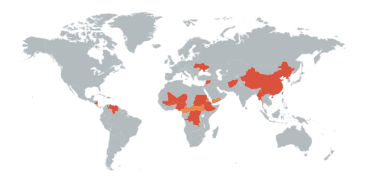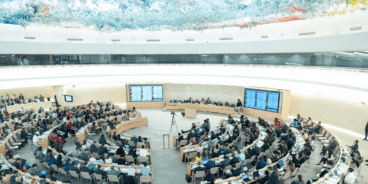
Russia Veto
Op-ed by Dr. Simon Adams in the Huffington Post
Diplomacy is a shadowy and unpredictable business, but one thing is certain. If Russia uses its veto this week to block a second UN Security Council resolution on Syria, innocent people will die.
On 4 October last year when Russia and China vetoed the Security Council’s first attempt to take action to halt crimes against humanity in Syria, the protest movement against the al-Assad regime was six months old. About 2,700 civilians had been killed by the regime.
In the four months that have passed since then, the killing has accelerated. The death toll has more than doubled. At least 5400 have died, including 253 children.
The veto cost lives. The Syrian regime was emboldened to intensify its assaults on towns that had risen in opposition to the government and shot down protestors in ever greater numbers. Homs was shelled by tanks. Hama was stormed by troops loyal the regime. Pro-government rallies in Damascus featured regime supporters waving Russian flags. The veto emboldened the Syrian government to defy those — including the UN Human Rights Council and the Arab League — who were calling for an end to its crimes against humanity.
Without a UN mandated arms embargo the Russians were also free to continue supplying the Syrian government with lethal weaponry. They did so with gusto. The Syrian regime currently has $4bn in active arms contracts with Russia. It is largely Russian bullets, guns, tanks and artillery that are doing the killing. Russia also recently signed a $550 million deal to provide Syria with fighter jets.
In January, a Russian aircraft carrier visited Tartus in Syria — the only Russian naval base outside a former Soviet republic. At the time Syria’s SANA news agency reported that the government “highly respects Russia’s honorable stance in support of the Syrian people.” The killing continued.
And now Russia is threatening to veto a second attempt by the UN Security Council to send a message to Damascus. Russia has attempted to deflect criticism by denouncing the Libyan intervention, the Western desire for Arab “regime change” and the alleged misuse of the UN concept of the “responsibility to protect” (or R2P). Their arguments would be slightly more convincing if grounded in fact.
It was Russia, after all, that first misused the important emerging norm of R2P when misapplying it to its attempted invasion of Georgia in 2008. At the time Foreign Minister Lavrov invoked R2P in order to justify a dubious Russian military intervention. He was fiercely criticized by leading R2P supporters like former Australian foreign minister and R2P inventor, Gareth Evans.
Lavrov has publicly stated his enduring opposition to any UN sanction of the Syrian regime. By contrast, Evans has gone on the record as saying that the Syrian government has “manifestly failed to exercise its Responsibility to Protect,” that “another veto will cost lives” and that united action by the Security Council is necessary to “prevent further catastrophe.” He has been joined by former General Romeo Dallaire and other eminent R2P supporters.
The truth is that the resolution proposed by Morocco in the Security Council this week is not calling for regime change or military intervention. It is a mild resolution even by the restrained standards of UN diplomacy. What the resolution does propose is that the killing in Syria must stop and that the Arab League should be supported in its efforts to resolve the crisis in a peaceful manner. That means talks not tanks. Shouting rather than shooting.
When Stalin, Churchill and Roosevelt set about the creation of the United Nations at the end of the Second World War they were primarily focused on the need to stop big countries preying upon weaker nations. The Security Council was designed so that the world’s five strongest powers could veto any action that directly threatened their national security and therefore prevent the catastrophe of another world war. Hypocrisies and superpower malfeasance aside, that was the intent.
It was never imagined that by the beginning of the twenty-first century most wars would not be between nations, but by governments against their own people. It was inconceivable to those who had played a role in defeating the genocidal Nazi regime that the veto would be used to protect future perpetrators of crimes against humanity from the Security Council’s critical gaze.
Syria now stands on the brink of civil war. Almost 6,000 people have been killed. At least a hundred have died so far this week as the majority of UN Security Council members desperately attempt to convince the Russian Ambassador not to vote against a tepid, but significant, resolution on Syria. Now is not the time for vetoes. Now is the time for the world to act.
Related Content


Letter to UN Human Rights Council members on atrocity prevention priorities at the Council’s 57th session
